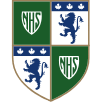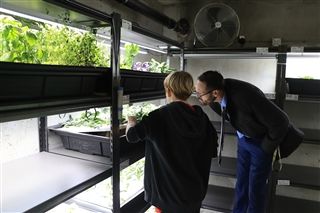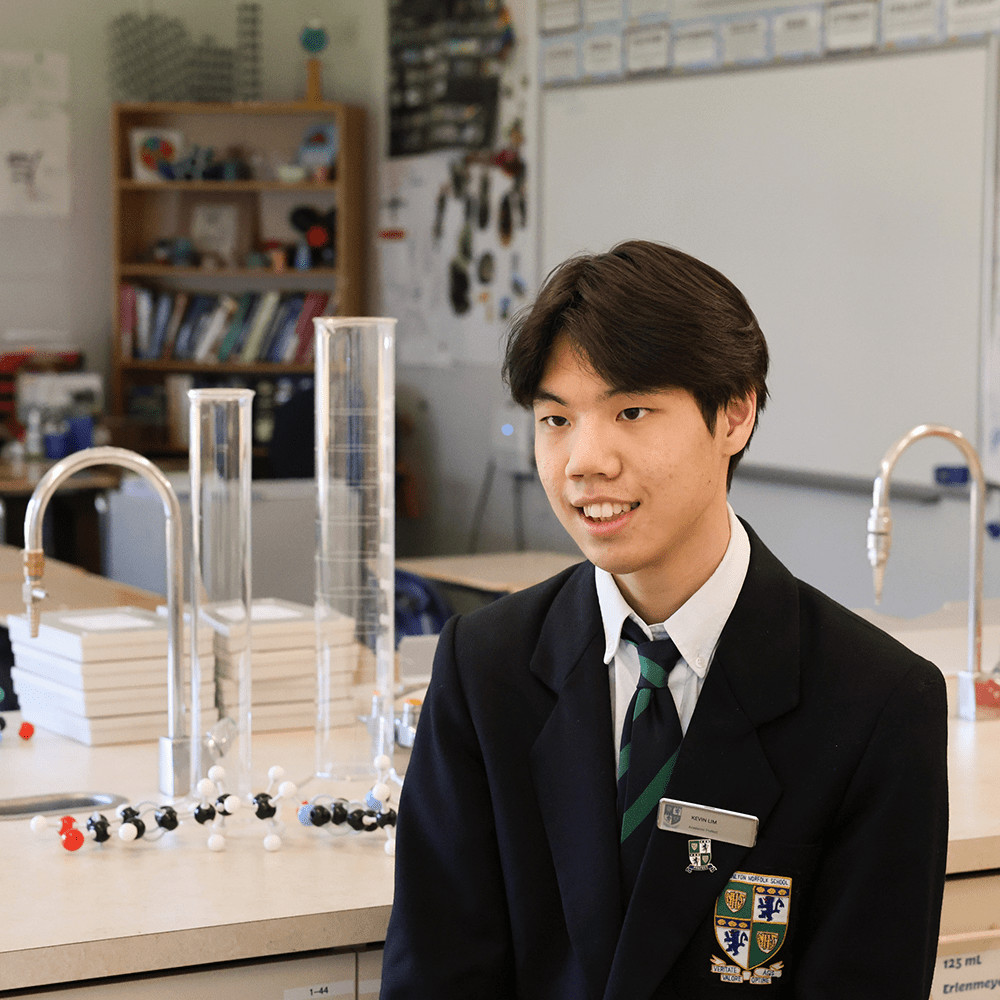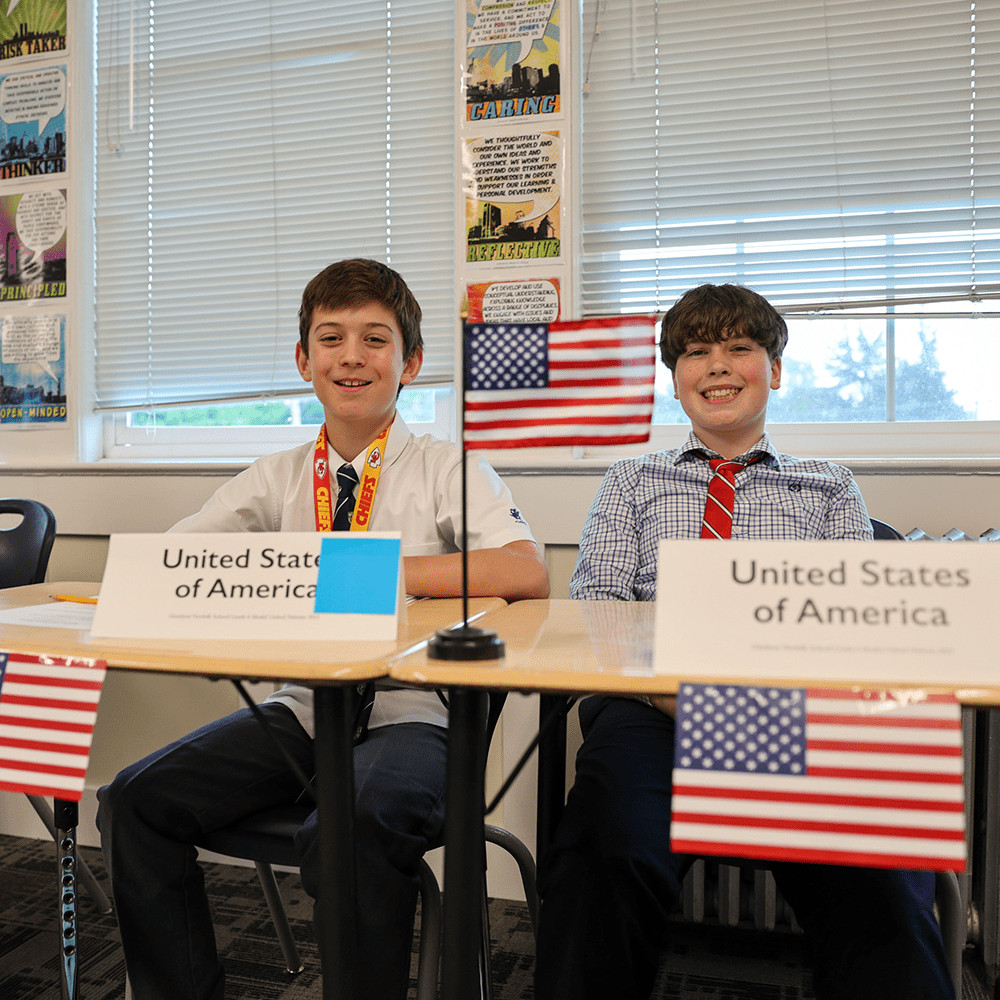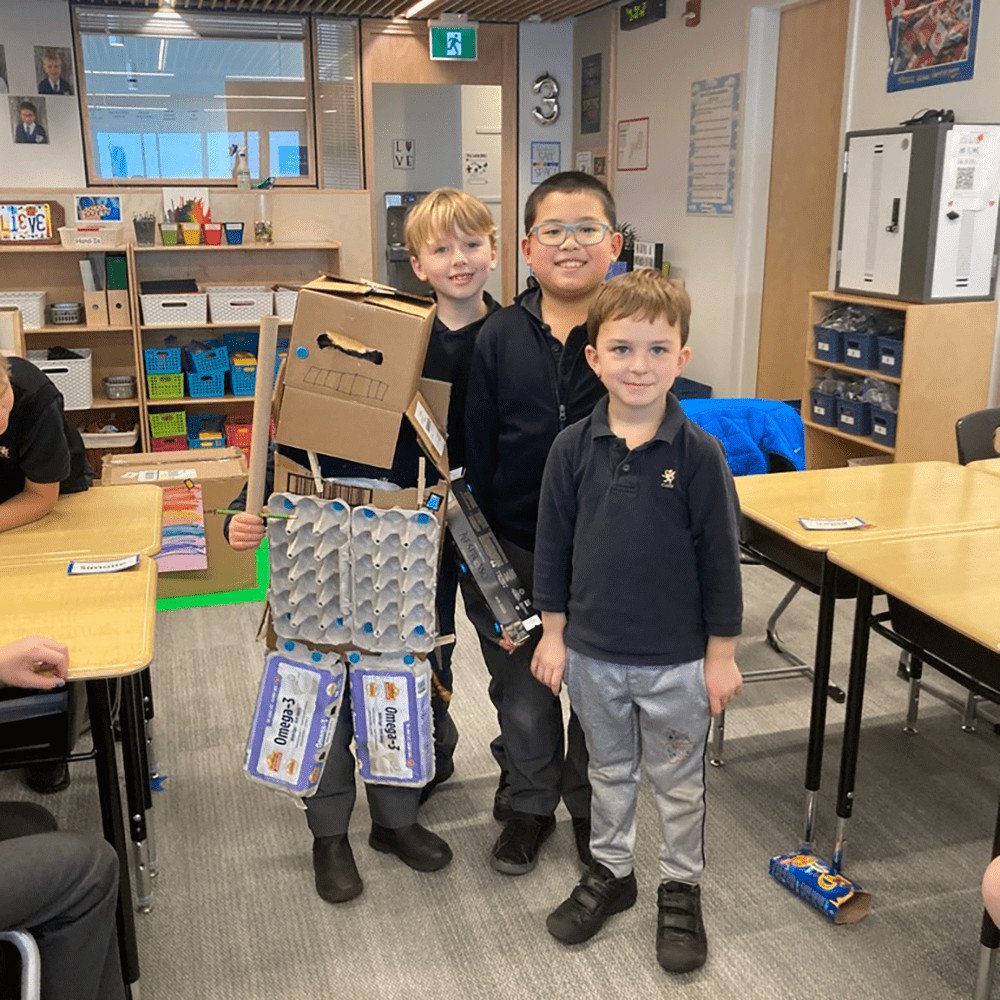One of the things that makes the programme exceptional is that the delivery is entirely adaptable to the changing times that have arisen from the introduction of artificial intelligence. It is future proof. By design.
According to the IB, the Primary Years (PYP), Middle Years (MYP), and Diploma Programmes (DP) “encourage both personal development and academic achievement, challenging students to think critically, to ask the right questions and think across disciplines. An IB education also fosters diversity, curiosity and a healthy appetite for learning.”
There are fundamental aspects of the IB philosophy of education that require students to bring whatever is learned or developed online into an authentic, real-world setting. For example, our Primary Years teachers at the Beach campus, literally bring lessons to life by raising salmon and releasing them into the wild. Each week, rain or shine, many Junior School students spend a day without walls during Nature School on the beach or in the natural spaces of Uplands Park. In addition, Grade 5 teachers have students growing leafy greens and very soon, oyster mushrooms, in our large in-house hydroponic sustainable food program. The opportunity to connect deeply with nature is just one aspect of an Unit of Inquiry in the Primary Years Programme and donating the food students produce back to members of the community in need is just one example of service learning designed to develop caring and culturally aware children who are active participants in their own learning. We also recognize the importance of connecting with each other.
Faculty are incredibly flexible with their teaching styles and vary their lessons throughout the day to offer time for students to collaborate with others and time for them to reflect and work independently. The facilities at the Junior School have been thoughtfully designed with this in mind and support classes coming together and using break-out spaces. If one were to take a visit to the Junior School on any given day, they may see the entire division (parents included) doing an animated singalong in the gym led by Rafe Hanes, our music teacher. Or, perhaps they’d come across a small group of students engaged in delivering friendly feedback through an expertly designed peer evaluation activity meant to show individuals where they sit in a writing continuum and identify where opportunities for growth are. Lastly, they may quietly stroll past a young reader being supported by one of our incredible Learning Strategies team members in the learning commons. The Approaches to Teaching that guide the design and delivery of the curriculum are enhanced at GNS with an eye on the learning experience.
All three IB programmes develop our students’ confidence in managing their own learning through a continued focus on the Approaches to Learning, a set of skills that IB students are supported to learn and demonstrate in order to be successful in their studies and in life beyond the classroom. These skills include creative thinking, communication, organization, research, and collaboration. The goal of fostering these skills is to help students become independent learners who can think critically, communicate effectively, and work well with others.
These skills can be applied across disciplines and serve as a common language for use by teachers with their students to reflect on and articulate the process of learning. Though not in stark contrast to AI learning, when refined over time through a process of self-reflection, these skills provide students with a personal understanding of the unique ways by which they learn most effectively; a particularly relevant example of real autonomous learning. Essentially, they are a set of skills intended to support individuals with “learning how to learn.” All IB teachers are required to integrate and explicitly teach the ATL’s through their units.
The following examples, collected by Gina Simpson, our Coordinator of Curriculum Planning, show the MYP, demonstrate how our faculty are teaching and using these skills in their subject lessons:
-
In PHE 6, students develop one of the Communication ATL skills of exchanging thoughts, messages and information effectively through interaction and giving and receiving meaningful feedback by taking turns using IPads to video their ‘team’ in ‘gameplay’, focusing on the strategy of forming triangles with your teammates in order to move to an ‘open space’ to assist with successful passing. This strategy is specific to ‘invasion’ games. The videographer then communicates with their team by reviewing the video and identifying instances of where they successfully meet the objective of ‘creating space by forming triangles’.In order to help students build their Information Literacy skills (finding and interpreting, judging and creating information and creating references and citations, to construct a bibliography according to recognized conventions), MYP Science classes introduce the tool of research cards. Created to organize notes taken while researching information about a topic, they are used as a tool for lab reports and larger research projects on technologies in science. Students are taught to create a card (slide) with paraphrased, point form information, and include their APA reference on the card. Once they are ready to write their draft, they can organize the sources notes (slides) in the proper order to match their plan, and use the information (already in their own words) to create their personalized draft. They can then include their in-text citation from the research card in their text without having to remember where they found that specific information. This also helps them understand academic integrity and select relevant information from sources.In PHE 8, students use their transfer skills (utilizing skills and knowledge in multiple contexts; combining knowledge, understanding, and skills to create products or solutions) by learning a variety of CrossFit routines to experience different coaching techniques and workout formats. Students then have three lessons to use the information provided, combined with their experiences in class, to plan a CrossFit station for their peers. They concentrate on refining functional movement exercises and research components of fitness, and safety considerations.In Theatre 9, during a unit on Theatre and Identity, students apply the ATL skill Research (finding information for disciplinary and interdisciplinary inquiries, using a range of media) as they approach the work of key Hip-Hop Theatre artists and discuss how those artists explore and express their identities and how Hip-Hop Theatre (and culture) impacts identity. Students practice the ATL skill of Communication as they share their research visually as well as in written form using appropriate citations and ‘according to recognized conventions.’ Students will ‘negotiate ideas and knowledge’ as they create a performance communicating aspects of their identity through the elements of Hip-Hop Theatre.In a Grade 9 Individuals and Societies unit on Colonization and Settlement of North America, students consider the European narrative and the lens through which they viewed North America at the time of colonization, compared to the Indigenous history, organization and relationship with the land. Research, comparison, and discussion on how the two paths crossed and the different perspectives and experiences of the process of colonization allowed students to use and improve upon their ATL skill of Critical Thinking to “revise understanding based on new information and evidence.”In Grade 9 Music (Band) in a unit on Storytelling through Music, students consider how compositional techniques and musical elements can be manipulated to describe a variety of different character traits or animal characteristics. Students listen to, discuss, and analyze a variety of musical examples and research musical terminology to use and improve upon their ATLs of Communication to “use and interpret a range of discipline-specific terms and symbols.”In IB Global Politics 11 there’s an intentional focus on Research skills. Students work on developing a strong and coherent research question to lead their research and written reports for the Internal Assessment and the HL Extension presentation. Students are guided through this process using a graphic organizer with prompting questions to allow them to think about all the components needed (topic, purpose, angle, questions, sentence stems). This process occurs at numerous points in the year, first as stand-alone lessons teaching the discrete skill and then embedded in the development of a project. Once research questions are developed, students use a peer feedback model to improve their questions.
These concrete examples provide evidence of how the Approaches to Learning skills are being directly incorporated into the scope and sequence of our curriculum in each course and at every stage in students’ development, and demonstrate the thought and care our faculty put into planning lessons that ensure authentic learning experiences and personal connection can be found across the school.

